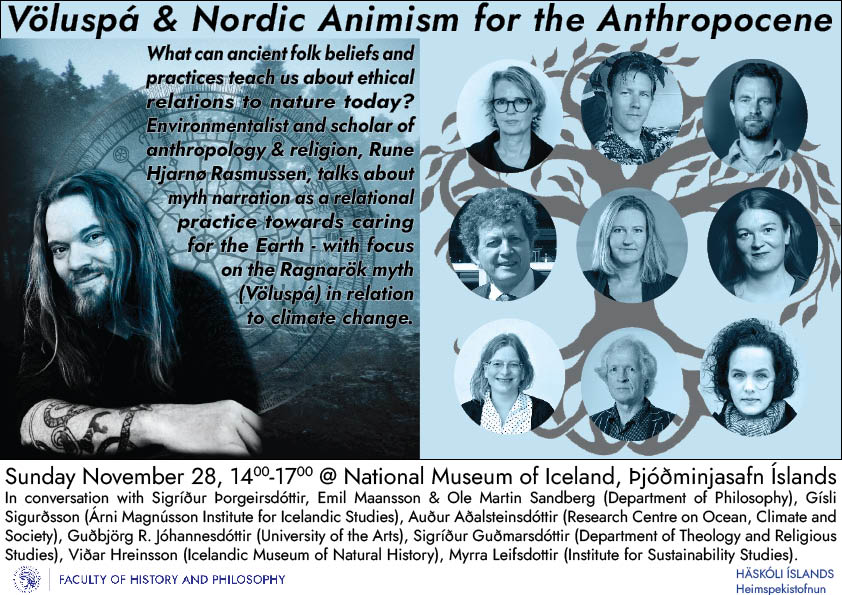I am organizing this event Sunday November 28, 14-17.00 at the National Museum of Iceland, Þjóðminjasafn Íslands.

Völuspá and Nordic Animism for the Anthropocene
What can ancient folk beliefs and practices teach us about ethical relations to nature today? Environmentalist and scholar of anthropology & religion, Rune Hjarnø Rasmussen, talks about myth narration as a relational practice towards caring for the Earth - with focus on the Ragnarök myth (Völuspá) in relation to climate change.
In conversation with Icelandic scholars Sigríður Þorgeirsdóttir, Emil Maansson & Ole Martin Sandberg (Department of Philosophy), Gísli Sigurðsson (Árni Magnússon Institute for Icelandic Studies), Auður Aðalsteinsdóttir (Research Centre on Ocean, Climate and Society), Guðbjörg R. Jóhannesdóttir (University of the Arts), Sigríður Guðmarsdóttir (Department of Theology and Religious Studies), Viðar Hreinsson (Icelandic Museum of Natural History), Myrra Leifsdottir (Institute for Sustainability Studies).
Facebook event: https://www.facebook.com/events/419597256300828
In recent years, indigenous scholars, panpsychist philosophers, New Animist anthropologists and a whole host of debaters and thinkers have made Animism a vibrant trend in current ways of relating to nature. Rune Hjarnø Rasmussens work applies indigenous scholarship and ontological turn thinking on the rejected knowledge and practices of our North European cultural history. This makes visible the historic rejection of Euro-Traditional Animism which results from the agenda of modernist epistemology of disembodying minds and deanimating matter. Folklore and popular culture are dense with animist knowledge and practice and this implies the possibility of cultural self-reflection in wider populations through which we may re-engage more sustainability oriented and less destructive forms of knowing and of being in the world. This is based on the respect and reciprocity implied in perceiving and relating with the world as a community of persons rather than an exterior resource storage.
Rune has been a prominent voice in reanimating the interest in Nordic Animist practices in recent years. He maintains a youtube-channel that combines scholarly debates and popular storytelling, has published the book and corresponding calendars "The Nordic Animist Year", and helped create the "Raven Flag" as a totemic symbol of kinship between man and nature which has become a symbol amongst others for environmental activists. Rather than idolizing a lost past, he asks what we can do with it in the present. Rejecting the often masculinist and nationalist tendencies in Neo-Paganist milieus he emphasizes an embodied and relational practice of caring for ourselves, for each other, and for the world. See more at nordicanimism.com
This ethical relationship is ever relevant, especially today as we are facing a biodiversity and a climate crisis, both of which fill many people with grief at the inconceivable loss and an anxiety about what the future might hold. We are not the first to have faced such a crisis. The feeling that the world is coming to and end is passionately expressed in the Völuspá - the story of Ragnarök - which might have been inspired by earlier climatic changes. This grief is also an expression of our care for the world.
In the United Nations Environment Program Report, "Making Peace With Nature", Secretary-General António Guterres says we must transform our relationship with nature to recognize its true value. Long-lasting animist practices might possibly contain elements that can help us in this vital task.
After the lecture Rune will be joined by scholars from the University of Iceland in a discussion of the philosophical and ethical applications today as we are facing our own version of "Ragnarök".
The event will be at the National Museum of Iceland, Þjóðminjasafn Íslands, Sunday November 28, 14-17.00.
Hosted by the Institute of Philosophy (Heimspekistofnun) & supported by The Institute for Sustainability Studies (Stofnun Sæmundar fróða) University of Iceland
